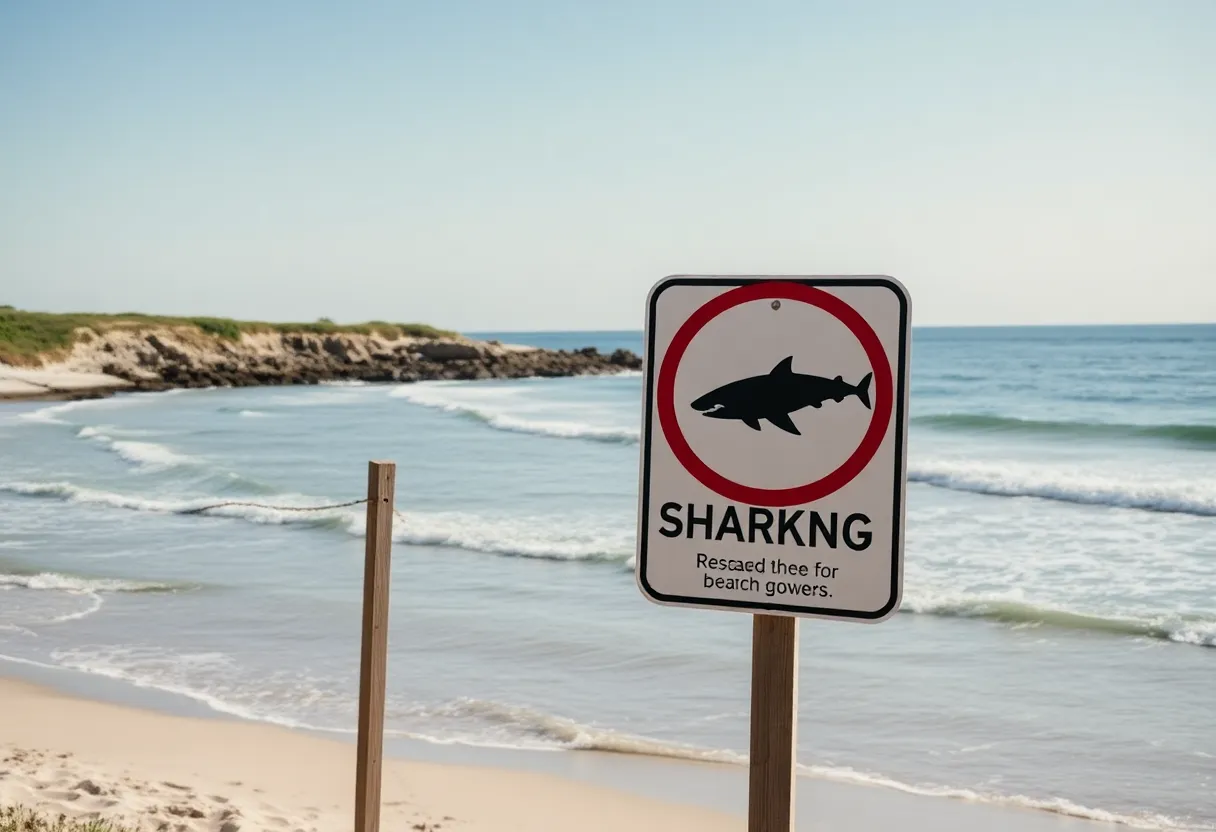News Summary
The Massachusetts Division of Marine Fisheries has confirmed the sighting of the first great white shark of the season in Nantucket on May 11. Beachgoers are urged to be cautious as recent incidents, including a seal attack, highlight the presence of sharks in local waters. Awareness initiatives encourage the public to understand shark behavior and adopt safety measures while enjoying the beach. Scientists emphasize the importance of vigilance as marine ecosystems recover, leading to increased shark sightings in the region.
Nantucket, Massachusetts – The Massachusetts Division of Marine Fisheries has confirmed the arrival of the first great white shark of the season in Nantucket waters on May 11. This reopening of the marine seasonal cycle has been highlighted by recent incidents, including a shark attack on a seal reported off Smith’s Point in Madaket over the weekend, causing concern among beachgoers and marine biologists alike.
Witnesses reported seeing a pool of blood in the water as a seal swam towards the beach, closely followed by a shark. The incident has raised alarms about the presence of sharks in local waters, prompting marine scientists to urge the public to be “shark smart.” This initiative emphasizes the importance of understanding shark behavior and adopting safety measures when enjoying the beach.
John Chisholm, an adjunct scientist at the New England Aquarium’s Anderson Cabot Center for Ocean Life, highlighted the necessity of public awareness regarding sharks, particularly in shallow waters where interactions are more likely. Beachgoers are advised to be cautious of areas with visible seals or schools of fish, as these can attract sharks. Staying close to the shore is recommended to ensure rapid assistance from emergency responders if necessary.
For those wishing to enhance their awareness regarding shark activities, the Atlantic White Shark Conservancy offers the Sharktivity app, which provides real-time notifications about shark sightings and movements. This tool aims to promote safety and coexistence between humans and sharks in New England waters.
Recent research indicates that an increase in shark sightings may suggest a recovering marine ecosystem, according to Nick Whitney, a senior scientist at the Anderson Cabot Center. However, this brings about the need for heightened vigilance among beachgoers. Marine scientists are continually researching various shark species present in the region, including porbeagle, mako, and thresher sharks, among others. The study aims to maintain ecological balance and inform the public about marine life interactions.
In total, there are over 15 shark species that inhabit New England waters throughout the year, including the massive great white sharks, which can grow up to 21 feet long, weigh as much as 4,500 pounds, and exert a bite force of up to 1.8 metric tons. Known for their impressive speeds of up to 35 mph and lifespan of over 70 years, great whites are a crucial part of the marine ecosystem.
Georgia is seen as a habitat for many shark species, including those perceived as harmless to humans such as blue sharks and whale sharks. Current scientific efforts have helped certain species, like sand tiger sharks, show signs of recovery due to protective measures against overfishing and habitat destruction. In contrast, the decline of white sharks in regions like South Africa has caused significant ecological imbalances, reiterating their role as vital predators in maintaining marine health.
Researchers at the Anderson Cabot Center utilize advanced tagging technologies, including satellite and acoustic tags, to monitor the behavior and populations of sharks in New England waters. As outlined by Ryan Knotek, an associate research scientist, the perception of shark diversity is often limited, yet there are at least 23 species locally, enhancing the importance of understanding these marine animals.
In addition to their research efforts, the Atlantic White Shark Conservancy will be featured in an upcoming episode of National Geographic’s “Sharkfest,” which will provide further insights into marine research and shark conservation efforts in the New England region.
In summary, as great white sharks make their seasonal return to Massachusetts waters, it is imperative for beachgoers to adopt a cautious and informed approach to ensure both their safety and the health of the ecosystem.
Deeper Dive: News & Info About This Topic
- Patriot Ledger
- Wikipedia: Great White Shark
- NBC Boston
- Google Search: Great White Shark
- Boston Herald
- Google Scholar: Great White Shark Conservation
- MassLive
- Encyclopedia Britannica: Sharks
- Kansas Reflector
- Google News: Shark Research

Author: STAFF HERE BOSTON WRITER
The BOSTON STAFF WRITER represents the experienced team at HEREBoston.com, your go-to source for actionable local news and information in Boston, Suffolk County, and beyond. Specializing in "news you can use," we cover essential topics like product reviews for personal and business needs, local business directories, politics, real estate trends, neighborhood insights, and state news affecting the area—with deep expertise drawn from years of dedicated reporting and strong community input, including local press releases and business updates. We deliver top reporting on high-value events such as Boston Marathon, Head of the Charles Regatta, and Boston Harborfest. Our coverage extends to key organizations like the Greater Boston Chamber of Commerce and Associated Industries of Massachusetts, plus leading businesses in finance, biotech, and insurance that power the local economy such as Fidelity Investments, Biogen, and Liberty Mutual Insurance. As part of the broader HERE network, we provide comprehensive, credible insights into Massachusetts's dynamic landscape.



